Related Research Articles
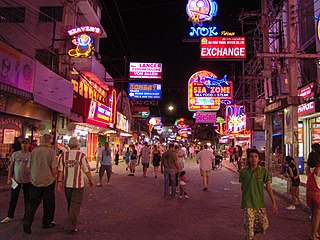
Prostitution in Thailand is illegal. However, due to police corruption and an economic reliance on prostitution dating back to the Vietnam War, it remains a significant presence in the country. It results from poverty, low levels of education and a lack of employment in rural areas. Prostitutes mostly come from the northeastern (Isan) region of Thailand, from ethnic minorities or from neighbouring countries, especially Cambodia, Myanmar, and Laos. In 2019, UNAIDS estimated the total population of sex workers in Thailand to be 43,000.

Prostitution in Taiwan was made illegal under a 1991 law. Legislation was introduced in 2011 to allow local governments in Taiwan to set up "special zones" where prostitution is permitted. Outside these zones prostitution is illegal. As of 2017 no "special zones" had been opened.

In Great Britain, the act of engaging in sex as part of an exchange of various sexual services for money is legal, but a number of related activities, including soliciting in a public place, kerb crawling, owning or managing a brothel, pimping and pandering, are illegal. In Northern Ireland, which previously had similar laws, paying for sex became illegal from 1 June 2015.
Prostitution in South Korea is illegal, but according to The Korea Women's Development Institute, the sex trade in Korea was estimated to amount to 14 trillion South Korean won in 2007, roughly 1.6% of the nation's GDP. According to a survey conducted by the Department of Urology at the Korea University College of Medicine in 2015, 23.1% of males and 2.6% of females, aged 18–69, had sexual experience with a prostitute.
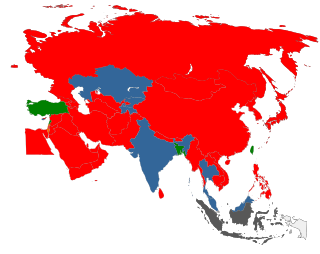
The legality of prostitution in Asia varies by country. There is often a significant difference in Asia between prostitution laws and the practice of prostitution. In 2011, the Asian Commission on AIDS estimated there were 10 million sex workers in Asia and 75 million male customers.

Prostitution is illegal in the vast majority of the United States as a result of state laws rather than federal laws. It is, however, legal in some rural counties within the state of Nevada. Additionally, it is decriminalized to sell sex in the state of Maine, but illegal to buy sex. Prostitution nevertheless occurs elsewhere in the country.
Prostitution in Iceland is thriving despite paying for sex being illegal.
Prostitution in Greece is legal at the age of 18, and regulated. It is estimated that fewer than 1,000 women are legally employed as prostitutes and approximately 20,000 women, half of whom are of foreign origin and the other half are Greek, are engaged in illegal prostitution. Many women affected by the economic crisis have turned to prostitution through poverty.
Prostitution in South Africa is illegal for both buying and selling sex, as well as related activities such as brothel keeping and pimping. However, it remains widespread. Law enforcement is poor.
Prostitution in Chile is legal, subject to regulation, but related activities such as keeping brothels and pimping are prohibited. Several hundred women were registered as prostitutes with the National Health Service.

Prostitution in Pakistan is a taboo culture of sex-trade that exists as an open secret but illegal. Prostitution is largely based in organisational setups like brothels or furthered by individual call girls.

Prostitution is legal and regulated in Bangladesh. Prostitutes must register and state an affidavit stating that they are entering prostitution of their own free choice and that they are unable to find any other work. Bangladeshi prostitutes often suffer poor social conditions and are frequently socially degraded.
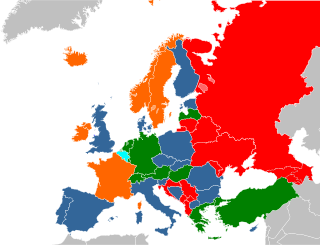
The legality of prostitution in Europe varies by country.
Prostitution in Rwanda is illegal in all aspects. Prostitutes, clients and any involved third parties are criminalised by the country's Penal Code. However, a draft of a new Penal Code that does not prohibit prostitution was presented for debate in the Rwandan Parliament in December 2017.

The legal status of prostitution in Africa varies widely. It is frequently common in practice, partially driven by the widespread poverty in many sub-Saharan African countries, and is one of the drivers for the prevalence of AIDS in Africa. Senegal and Côte d'Ivoire permit the operations of brothels. In other countries, prostitution may be legal, but brothels are not allowed to operate. In some countries where prostitution is illegal, the law is rarely enforced.

Prostitution laws varies widely from country to country, and between jurisdictions within a country. At one extreme, prostitution or sex work is legal in some places and regarded as a profession, while at the other extreme, it is considered a severe crime punishable by death in some other places. A variety of different legal models exist around the world, including total bans, bans that only target the customer, and laws permitting prostitution but prohibiting organized groups, an example being brothels.
Prostitution in East Timor is legal, but soliciting and third party involvement for profit or to facilitate prostitution is forbidden. Prostitution has become a problem since the country gained independence from Indonesia in 2002, especially in the capital, Dili. There are estimated to be 1,688 sex workers in the country.
Prostitution in Botswana is not illegal, but laws such as public disorder, vagrancy, loitering and state recognised religious provisions are used to prosecute prostitutes. Related activities such as soliciting and brothel keeping are illegal. Botswana has made proposals to make prostitution legal to prevent the spread of AIDS. However, there has been mass opposition to it by the Catholic Church. Prostitution is widespread and takes place on the street, bars, hotels, brothels and the cabs of long-distance trucks.
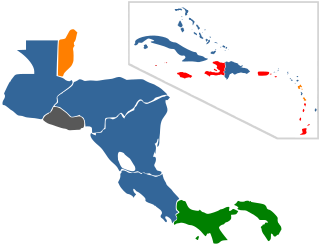
Legality of prostitution in the Americas varies by country. Most countries only legalized prostitution, with the act of exchanging money for sexual services legal. The level of enforcement varies by country. One country, the United States, is unique as legality of prostitution is not the responsibility of the federal government, but rather state, territorial, and federal district's responsibility.
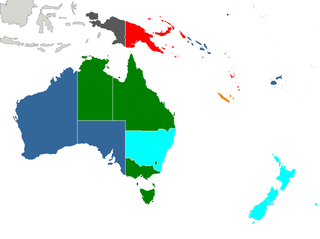
Prostitution in Oceania varies greatly across the region. In American Samoa, for instance, prostitution is illegal, whereas in New Zealand most aspects of the trade are decriminalised.
References
- 1 2 3 4 5 6 "Sex Work Law". Sexuality, Poverty and Law Programme. Retrieved 21 November 2017.
- ↑ Chand, Shalveen (26 May 2016). "Of course it sells!". Fiji Times Online. Retrieved 4 February 2018.
- ↑ "RED LIGHT TURF WAR: Chinese criminal elements take over prostitution market and drive out local 'Ladies of the Night', POLICE failing to ACT". Fiji Leaks. 20 July 2017. Retrieved 4 February 2018.
- ↑ "Sex workers: Population size estimate - Number, 2016". www.aidsinfoonline.org. UNAIDS. Archived from the original on 4 June 2019. Retrieved 21 July 2018.
- ↑ Gopal, Avinesh (11 May 2019). "Police: No Legal Powers To Arrest Unless Reported". Fiji Sun Online. Retrieved 12 November 2019.
- 1 2 "Fiji 2017 Trafficking in Persons Report". U.S. Department of State. Archived from the original on 3 July 2017. Retrieved 4 February 2018.
 This article incorporates text from this source, which is in the public domain .
This article incorporates text from this source, which is in the public domain . - ↑ "Fiji urged to end the silence and crackdown[sic] on child prostitution". Reuters. 8 December 2017. Retrieved 9 December 2017.
- ↑ "Crimes Decree 2009" (PDF). Republic of Fiji Islands Government Gazette. 5 November 2009. Retrieved 21 November 2017.
- 1 2 McMillan, Karen; Worth, Heather. "Sex Workers and HIV Prevention in Fiji - after the Fiji Crimes Decree 2009" (PDF). University of New South Wales. Retrieved 21 November 2017.
- ↑ "Fiji 2018 Trafficking in Persons Report". U.S. Department of State. Archived from the original on 29 July 2018. Retrieved 29 July 2018.